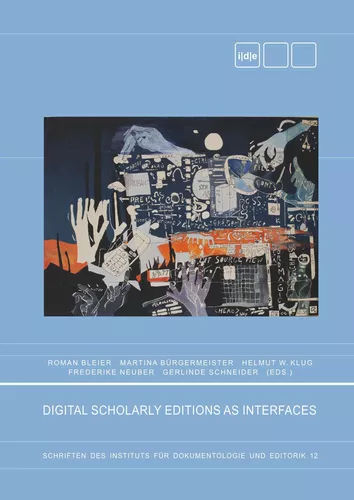
Digital Scholary Editions as Interfaces
Band 12: Schriften des Instituts für Dokumentologie und Editorik
ePUB
8,4 MB
DRM: kein Kopierschutz
ISBN-13: 9783748115762
Verlag: Books on Demand
Erscheinungsdatum: 15.11.2018
Sprache: Englisch
Barrierefreiheit: Eingeschränkt zugänglich
erhältlich als:
inkl. MwSt.
sofort verfügbar als Download
Du schreibst?
Erfüll dir deinen Traum, schreibe deine Geschichte und mach mit BoD ein Buch daraus!
Mehr Infos
Roman Bleier (Hrsg.)
Roman Bleier studied History and Religious Studies at the University of Graz. Following his studies in Graz, he worked on the Saint Patrick's Confessio HyperText Stack, a project of the Royal Irish Academy in Dublin, and completed a Ph.D. in Digital Arts and Humanities at Trinity College Dublin. After finishing his Ph.D. in 2015, he was CENDARI Visiting Research Fellow at King's College London and worked at An Foras Feasa, the Digital Humanities Centre at Maynooth University. In 2016 he returned to Graz as DiXiT Fellow and has since worked as postdoctoral researcher on different digital scholarly editing projects at the Centre for Information-Modelling of the University of Graz.

Martina Bürgermeister (Hrsg.)
Martina Bürgermeister studied History and Digital Humanities. Since 2013, she has been working at the Austrian Centre for Digital Humanities - Centre for Information Modelling at the University of Graz. In 2014, she started co-developing the platform monasterium.net within the project Illuminierte Urkunden als Gesamtkunstwerk.

Helmut W. Klug (Hrsg.)
Helmut W. Klug is a medievalist and strongly interested in Digital Scholarly Editions as means for making availabe historical sources. He is project assistant in the federally funded infrastructure project Kompetenznetzwerk Digitale Edition. He researches culinary history with a focus on the Middle Ages and Early New Times and heads the Austrian team of a French-Austrian cooperation project that aims at providing and analysing all German, French and Latin cooking recipe collections.

Frederike Neuber (Hrsg.)
Frederike Neuber is a textual scholar currently working as research developer for digital scholarly editions at the Berlin-Brandenburg Academy of Sciences and Humanities. Previously she was a DiXiT-fellow based at the Centre for Information Modelling at the University of Graz. She is a member of the Institute for Documentology and Scholarly Editing.

Gerlinde Schneider (Hrsg.)
Gerlinde Schneider is a software developer at the Centre for Information Modelling at the University of Graz. She is involved in a number of research projects in the field of language technologies as well as digital edition and specializes in web engineering. Her interests lie in the areas of linked data and interoperability as well as the implications of software use in humanities research.





Es sind momentan noch keine Pressestimmen vorhanden.